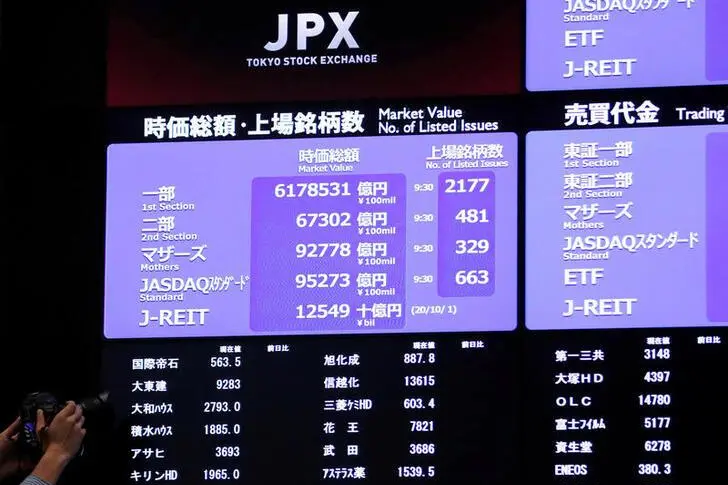PHOTO
HONG KONG - Global stock markets took a breather on Thursday as investors weighed data showing a steady jobs market recovery against a rise in producer prices, with the debate continuing over when the Federal Reserve will start to ease stimulus.
A U.S. Labor Department report showed the number of Americans filing new claims for unemployment benefits fell last week, as expected, while a separate reading showed U.S. producer prices rose more than expected through July.
MSCI's gauge of stocks across the globe, which hit a record high on Tuesday, shed 0.15%.
U.S. stock indices were lower in early trade. The Dow and S&P 500 had closed at record highs on Tuesday.
After an hour of trading, the Dow Jones Industrial Average .DJI fell 90.81 points, or 0.26%, to 35,394.16, the S&P 500 lost 3.74 points, or 0.08%, to 4,443.96 and the Nasdaq Composite dropped 8.13 points, or 0.06%, to 14,757.01.
European stocks, meanwhile, were attempting to equal their longest winning streak since 2017. The pan-European STOXX 600 index rose 0.01%.
Market chatter was still dominated by Wednesday's U.S. consumer price inflation data. A slowdown in the pace of price increases took some heat out of speculation over when the Federal Reserve might taper its massive bond buying program.
"That makes it more likely that inflation will ease back to the 2% target by itself and less likely that the Fed will have to hike interest rates more aggressively than so far assumed," currency analysts at Commerzbank said in a note.
U.S. Treasury yields continued to rise.
Benchmark 10-year notes last /32 in price to yield 1.359%, from 1.359% late on Wednesday.
In the FX market, the dollar was still near a four-month peak against major peers after it, too, retreated after the inflation data.
The dollar index rose 0.117%, with the euro EUR= down 0.09% to $1.1726.
BEARS IN THE CHINA SHOP
A significant number of U.S. earnings reports were due later in the day. Walt Disney will report, along with Airbnb, Doordash and Chinese internet giant Baidu, whose U.S.-listed shares have more than halved since February as Beijing makes sweeping regulatory changes.
Asian shares dropped again overnight, dragged down by a 0.8% fall in Chinese blue chips .CSI300 and a 0.5% drop in Hong Kong .HIS as weaker-than-expected China lending data triggered liquidity concerns.
Among the biggest sliders was Chinese online insurer ZhongAn 6060.HK , which fell 11.5% after state media said China's banking and insurance regulator would step up scrutiny of online insurance companies.
Nervous traders have been quick to respond to remarks from Chinese state media and officials, after many were surprised by last month's tougher-than-expected new rules for the private tutoring sector, one of several regulatory crack-downs that have roiled sectors from technology to property.
Whereas the main all-world stock indexes have been hitting regular record highs, MSCI's main Asian benchmark is now down more than 10% from its February peak. Some Chinese stocks have lost nearly 90%.
"The money is just in the U.S. and European markets right now, and that's our preferred market too," said Daniel Lam, senior cross-asset strategist at Standard Chartered Wealth Management.
U.S. crude recently rose 0.01% to $69.26 per barrel and Brent was at $71.47, up 0.04% on the day.
U.S. President Joe Biden's administration on Wednesday urged the Organization of the Petroleum Exporting Countries and its allies, known as OPEC+, to boost oil output to tackle rising gasoline prices that they see as a threat to the global economic recovery.
Gold also declined. Spot gold dropped 0.3% to $1,746.44 an ounce. U.S. gold futures fell 0.28% to $1,745.50 an ounce.
(Additional reporting by Devik Jain and Ambar Warrick in Bengaluru; Editing by Kim Coghill, David Holmes and Dan Grebler) ((matthew.scuffham@thomsonreuters.com; +1-332-201-0609; Reuters Messaging: matthew.scuffham.reuters.com@reuters.net))





















